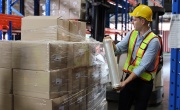UK Government launches bioplastics drive
The Department for Business, Energy and Industrial Strategy (BEIS) has announced a drive to encourage innovation in bioplastics.

The £60-million government investment, which BEIS says is part of the biggest boost to research and development (R&D) in the UK’s history, will be accompanied by an expected £149 million from businesses. This funding will contribute towards the development of new forms of packaging made from plants, wood chippings and food waste, reducing the carbon impact associated with oil-based plastics.
Commenting on the announcement, Business Secretary Greg Clark said: “We have all seen the enormous damage being caused by single-use plastics across the world. The race is on to develop new, effective and practical solutions to end the scourge of single-use plastics, helping to protect our planet for future generations.”
The drive towards bioplastics comes as part of the government’s Clean Growth challenge – itself a pillar of the modern Industrial Strategy – which aims to push UK industry towards low carbon growth.
Clark explained: “We have put a record level of R&D investment at the heart of our Industrial Strategy – investing to support our best minds and businesses in developing the solutions and industries of tomorrow.
“This government and business co-investment clearly demonstrates that when it comes to cutting plastics pollution there is a shared ambition. This is a unique opportunity for our world-leading businesses and innovators to develop the materials of the future with the potential to transform our economy as well as the environment.”
Alternatives to plastic made from plants have already benefited from funding through the Industrial Strategy, as well as what the government describes as ‘products that degrade easily in an open environment’ – such as the edible and biodegradable seaweed-based packaging made by London-based start-up Skipping Rocks Lab.
‘The materials of the future’?
The market for bioplastics is growing rapidly, with supermarkets across the UK, such as the Co-op and Waitrose, cutting down on single-use plastic by introducing reusable and compostable bags.
Sainsbury’s has recently committed to removing 10,000 tonnes of single-use plastic from its shelves this year, as well as removing plastic bags for fresh fruit and vegetables.
Commenting on the news from BEIS, Judith Batchelar, Director of Sainsbury’s Brand, said: “The plastics challenge is one of the greatest issues for our planet, so today’s announcement is fantastic news for retailers like Sainsbury’s that are already committed to reducing single-use plastics.
“But this is an issue that affects all retailers and manufacturers so it’s only by working together that we can make genuine progress and significantly reduce the nation’s reliance on plastic. This fund will act as a catalyst for this ‘coalition of the willing’ to address the research and innovation opportunities together and Sainsbury’s is proud to play our part.”
Whether the UK will go as far as the French Government, which in 2016 passed a decree to ban single-use plastic bags from shops, declaring that all bags must be bio-based and compostable, remains to be seen.
Difficulties with bioplastics
Although bioplastics are a viable alternative to oil-based plastics, they are not a silver bullet to end the problem of plastic waste.
Problems can arise when bioplastics are thrown away. Although many plant-based materials, such as Vegware, are compostable, they don’t always reach the industrial composting facilities that can process them. Many councils that collect food waste don’t send it for composting, preferring anaerobic digestion, meaning that compostable materials cannot be put in the food waste bin – or if they can, they will often be taken out of the food waste stream by the reprocessor and sent for incineration.
Out of the house, collection infrastructure for compostable materials is uncommon. As a result, compostables can contaminate batches of recycled plastic and damage recycling machinery. Moreover, if compostable plastics end up in landfill, where they will be mixed with huge piles of other waste, they won’t be able to decompose as intended. More rigid, non-compostable bioplastics are sometimes able to be recycled with normal plastics, but this is not always the case, creating the potential for consumer confusion.
Plant-based packaging manufacturer Vegware, which produces over 300 compostable catering products, has developed a collection scheme, entitled ‘Close the Loop’, in a bid to ensure that Vegware products don’t end up in landfill. This scheme, which is currently operating in most of Scotland as well as in Bristol, Worcestershire and Gloucestershire, sees Vegware collect its used products from businesses and take them on to industrial composting facilities.
Many organisations are seeking to introduce plant-based packaging in response to the public backlash over plastics. However, as a recent report has revealed, good intentions do not always produce good results. The Houses of Parliament announced in September 2018 that it would be replacing some of its single-use plastic items with compostable alternatives from Vegware – but an investigation by Foodservice Footprint revealed that ‘large volumes’ of compostable materials from the Houses of Parliament are being sent for incineration rather than to composting facilities.
Alongside the funding announcement, BEIS has published a call for evidence on standards for bio-based and biodegradable plastics, seeking evidence from scientists, manufacturers and the research community on the sustainability, wider impacts and end-of-life destinations of these new materials, which may go some way towards assuaging concerns.
The consultation closes at 11:45pm on 14 October 2019 and anyone wishing to respond can do so on the government website.








